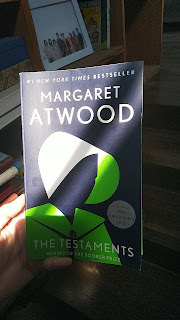The Handmaid's Tale, the book, the series, and the sequel
Margaret Atwood is on another level. Truly. I have never had the pleasure of reading the work of a truly singular and well-versed author, with a special talent for vocabularies.
I actually watched the television series first, sometime ago
when it first came out. Only the first season, and I found it truly remarkable.
But I lost touch with the following seasons, until the release of season four
last year. With the pandemic, and a little too much time on our hands, I decided
to rewatch it from the first season to the fourth.
And then, I decided to read the books. Just to see how the
series came to life from the original pages of the book.
Imagine being Atwood, to start writing it in 1984, as an
afterthought of World War II. How controversial it must have been to create a
theocratic totalitarianism government out of the ruins of Cambridge. But it was
certainly a genius of her to create a dystopian world from an account of a
survivor, or witness. To write in such a way that makes the readers fully
resolved to empathize and reimagine the nuance of it from the perspective of a
victim, or a heroine.
A bed. Single, mattress medium-hard, covered with a
flocked white spread. Nothing takes place in the bed but sleep; or no sleep. I
try not to think too much. Like other things now, thought must be rationed.
There’s a lot that doesn’t bear thinking about. Thinking can hurt your chances,
and I intend to last. I know why there is no glass, in front of the watercolor
picture of blue irises, and why the window only opens partly and why the glass
in it is shatterproof. It isn’t running away they’re afraid of. We wouldn’t get
far. It’s those other escapes, the ones you can open in yourself, given a
cutting edge. -- p. 8 Handmaid’s Tale
Above is a striking example of how efficient and concise her
style of writing. In one paragraph, not only did she describe to her readers
the room of our precious Handmaid, but also her state of mind. Our heroine is
clearly in a survival mode. She also described the heavy restrictions and
suffocating pressures imposed on an individual living in Gilead.
After reading through the pages, I applaud the producers and
writers of the show. As someone who have read the books and watched the shows,
I certainly thank them for filling in the gaps and shadows created by the book.
As it was a testimony, and rightfully written as such, there were certain gaps
and undescribed technical accounts of “how” events unfold. The writers of the
show, have taken great care in filling in these “intervals”, in a plausible yet
theatrical way, which makes it a most engaging television series.
There were certain differences, such as the story of how
June escapes Gilead with Baby Nicole, or how June helped the escape of many
children out of Gilead, or the death of Commander Waterford by the hands of the
escaped victims, that were not inscribed in the book but exists in the series. These
are additional breath of fresh air to the story, I think, though people may not
agree.
Another thing I took a note of was that the creators of the
show retained most of the original narrative inscribed in the book. The above
paragraph, for example, was spoken for by our heroine in the show, as she was
standing in her attic room.
Now girls, a little of fangirling won’t hurt anybody, right?
But I have to say, I really love the chemistry of June and Nick portrayed by
Elizabeth Moss and Max Minghella in the show. In the book, we have a sense of
the attraction between them, but as our heroine was (supposedly) recording the
statements for Luke (her husband, pre-Gilead), she did not describe in much
detail what else happened between them. We also understood enough that she was
making a life out of anything she can hold on to while she was in Gilead. And
both the book and the show truly pictured that melancholy love and attraction
in such a subtle but almost like a necessity, something to keep our heroine
sane in the twists and turns she had to endure.
The Testaments
The sequel of the story, The Testaments, was another proof
of Atwood literary accomplishments (as if she needs another). The book is a
compilation of witness statements from the three central characters of June’s
story, Aunt Lydia, Baby Nicole, and Agnes Jemima. Now imagine this, you have to
tell three perspectives in one book, one of which was an Aunt, a leader of a
heretic brigade, another was a girl that grew up in a bubble that is Gilead,
and an oblivious survivor that grew up observing Gilead from the outside world.
I was disappointed at first, because I was looking forward
to continue June’s journey in the sequel. However, as I went through the book,
I realized it was probably for the best. We have to understand that the
Handmaid’s tale, although it was a personal story of our June, it was also a
story of a silent uprising, against the tyrannical violence of men that governs
Gilead. June, represented the fate of Handmaids that had to endure myriad of
injustice acts, imposed upon them by self-righteous people of power. We were
reminded once again, that this was a war on Gilead, and what they claimed to be
their holy (yet hypocritical) values, which became their foundation to govern.
Atwood was very proficient in switching between the language
of an Aunt, who was once a Judge turned Mayday spy, and teenagers that are now
the present of Baby Nicole and Agnes. It takes a great deal of empathy and
energy to go into the minds of these three characters, and figure out what they
would do and how they would think, whilst witnessing the many deranged things
that usually happen in Gilead. There were many Bible reference and
inscriptions, and made up hymns and nursery rhymes, which truly resuscitate and
enriched the theocratic cultural nuance of Gilead.
I was slightly confused about the timeline and the age of
our characters (Aunt Lydia must be pretty old in this book), and about the
switching perspectives of our narrators. And only because of this, I may say I
prefer the first book. However, both are equally beautifully written,
especially due to the many vocabularies I learned from Aunt Lydia. She was
truly erudite! You will like her in this book, maybe.
It’s certainly exciting to see what the creators of the show
will come up with for our next season of the Handmaid’s tale. We might see more
of Nick and June, as they try to overturn Gilead, from inside out or outside
in. And I believe, we might also see our dear Aunt Lydia, growing into an even
more fearsome character to behold, as she reveals her true intentions as
written in the Testaments. I am not really sure if we will see Baby Nicole and
Agnes, as they may want to try to keep them for later seasons. However, I do
think we will understand more about Mayday and the Underground Femaleroad.
To conclude, Margaret Atwood, in my eyes, is truly a masterful literary proficient that is singular in her style of writing. And she has made a fascinating dystopian world and a whole new government with only a pen in her hands, in a time where wars and unruly leaders still resonates fear and pain in the minds of her readers. As such, she deserves the highest recognition, as the best female writer for me personally, and that you will not regret picking up these books in your spare time.



Comments
Post a Comment